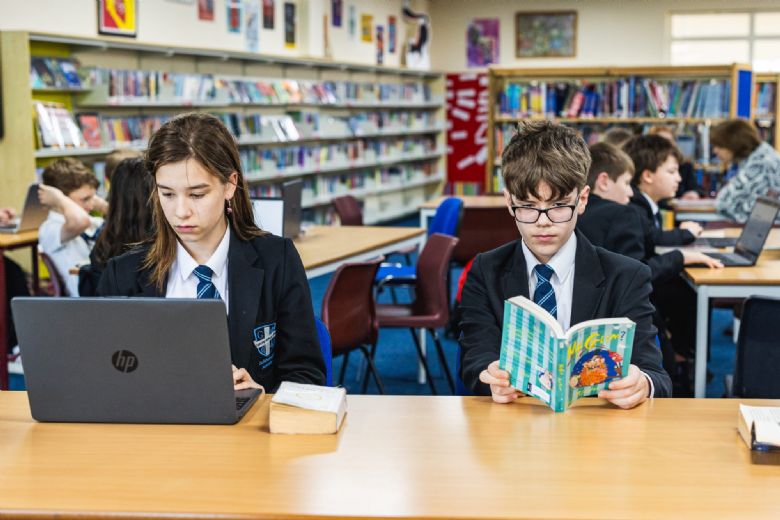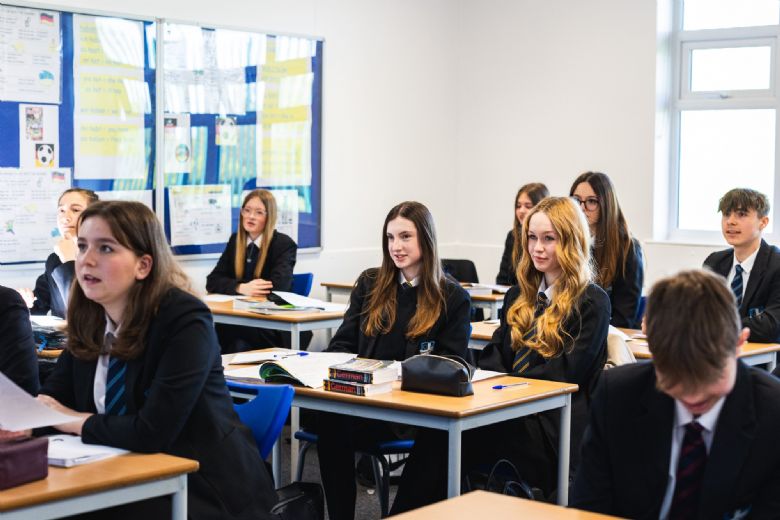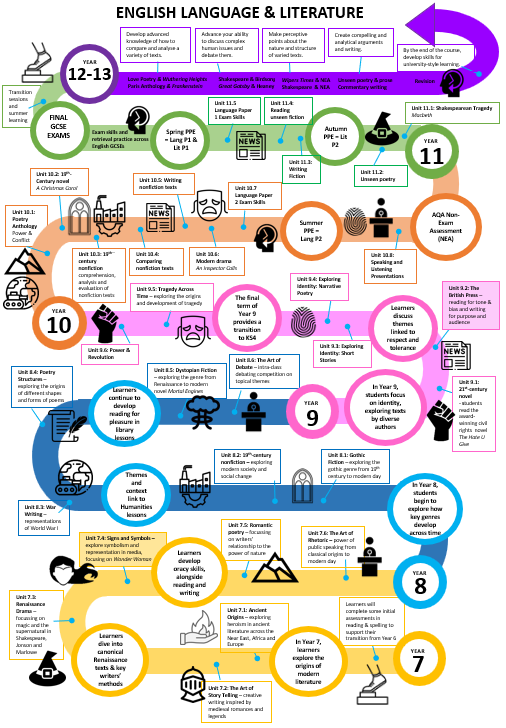English
We have high academic aspirations for all learners. With our adaptive approach to teaching, alongside our high expectations of respect and responsibility, we aim to meet the needs of all learners equally.
Our Curriculum
Our curriculum in English supports Guilsborough’s ethos of ‘Learning Without Limits’.
Across Key Stage 3 and 4, we offer students a knowledge-rich curriculum that builds cultural capital by exploring the development of literary forms and genres over time. Exposing students to a broad range of texts, from classical myths to modern novels, we develop their understanding of Britain’s long cultural history as well as its connection to other global cultures. Our connection to the Media department also means that our English curriculum has a Media flair, as students are taught elements of film study in Year 7 and explore the context of the British newspaper industry in Year 9.


We support students in identifying themselves as readers, developing their love for reading widely, across fiction, non-fiction and different authors. Library lessons form a core part of our KS3 curriculum, and students are supported in selecting from a range of texts appropriate to their reading age, as well as our newly launched Recommended Reads & Awesome Audios (using the Sora app). Students track their own progress through their Reading Logs, and the Library team celebrate students’ reading achievements each half term. For students who have barriers to reading, or who struggled with reading at KS2, we provide Fresh Start interventions, which start with the systematic teaching of phonics and move on to improving reading fluency and comprehension. We also work with the Sixth Form team, who run a Reading Buddies programme that pairs Year 12 and Year 7 students, to build students’ confidence with reading aloud.
At all levels, students are taught to enjoy writing as a craft: making judicious choices in their own writing at word-level, sentence-level and up to extended pieces of writing. Through our use of Sensational Sentences and the Deconstructed Essay, students are given a toolkit to turn them into confident and skilled writers. They are supported along the way by teachers who live model the writing process.
As well as being great readers and writers, in English we have the ambition for all our students to develop skills for everyday life and work. With oracy forming a core part of English lessons, students learn how to take part in debate, listen to others, respect different points of view and argue appropriately. We also teach these skills explicitly in units in Year 7 (The Art of Rhetoric) and Year 8 (The Art of Debate). Students develop their metacognition – the ability to learn how you learn – through memorisation, revision, and editing being explicitly taught across schemes of learning, especially in “crafting” lessons that follow assessments. Student assessments are stored in folders, so that they can track their own progress across time.
We aim to build students’ love of English and aspire for them to continue study at Key Stage 5. We are fortunate to be able to offer two engaging and challenging courses: A Level Literature and A Level Literature and Language. Many of our alumni have gone on to study English at Russel Group universities, including Oxford and Durham.
In short, we have high academic aspirations for all learners. With our adaptive approach to teaching, alongside our high expectations of respect and responsibility, we aim to meet the needs of all learners equally.
Home Learning
In English, all students are set weekly home learning tasks to support their learning in class, as homework has been shown to have a positive impact on average (+ 5 months), particularly with pupils in secondary schools.
At Key Stage 3, students alternate between a Reading for Pleasure task, tracked through their Reading Logs, and a skills-based quiz on Educake.
At Key Stage 4, students are set weekly revision tasks on Educake, which will also be supplemented with teachers setting additional writing or revision tasks in the lead up to assessments.
Our English curriculum journey shows how we develop the skills of our students and the topics the students cover in each year. Click on our learning journey below to view it in more detail.

Where will English take me past Year 11?
Sixth Form
As a core subject through primary, and years 7-11, when students come to choosing their A Levels, many see A Level English as natural progression. Although students may not see a definitive career in English in their future, the academic and cultural benefits are unquestionable. Discursive and exploratory essay writing; informed and perceptive debating; reading with insight and interpretation: the skills are endless, and widely recognised by higher education providers and employers.
At Guilsborough, we offer 3 subjects within the English Department:
A Level English Language and Literature
A Level Media Studies (studying this at KS4 is not necessary, though can be useful)
Please click on the different courses to explore studying these subjects at Guilsborough Sixth Form.
English and / or Media Studies complement many other subjects. Natural links are made between Humanities and Arts subjects. However, they can also complement science, business and maths subjects, to offer students the opportunity to concurrently develop their reading, interpretive and essay writing skills.
CAREERS
Pursuing English at A Level, and beyond, opens many doors in the world of work. Some of the more obvious professional routes would be Journalism (and its sub-disciplines e.g. Sports Journalism), Teaching, Lecturing, Advertising / Marketing and Publishing and Editing.
Other, less obvious career paths include:
- Logistics
- Politics and Public Service
- Hospitality and Events
- Graduate schemes at large multinational corporations such as PWC, Deloitte and M&S
Some of our past students who have studied English and / or Media Studies now have careers in:
Teaching: secondary (English, Drama, Theatre Studies) and primary, politics, the police force, social care
Please visit out Careers Guidance page for more information

